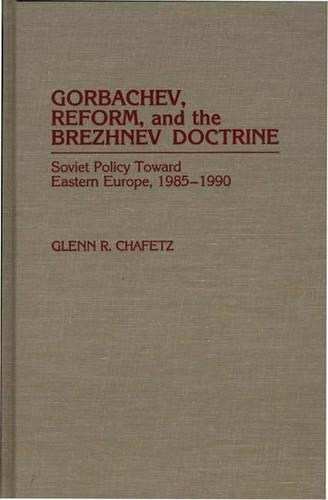
Gorbachev, Reform, and the Brezhnev Doctrine: Soviet Policy Toward Eastern Europe, 1985-1990
(Hardback)
Publishing Details
Gorbachev, Reform, and the Brezhnev Doctrine: Soviet Policy Toward Eastern Europe, 1985-1990
By (Author) Glenn R. Chafetz
Bloomsbury Publishing PLC
Praeger Publishers Inc
30th April 1993
United States
Classifications
Tertiary Education
Non Fiction
International relations
Central / national / federal government policies
European history
327.47
Physical Properties
Hardback
168
Description
Most people will admit that in 1985 they could not imagine that during their lifetime the Soviet Union would permit the Berlin Wall to fall, would allow democratic elections in Eastern Europe, and would withdraw its troops from the region, ending the Cold War. Yet, between 1985 and 1990, the Soviet Union reoriented its foreign policy rapidly, decisively, and peacefully. This book explains why the Soviet Union abandoned its long-term policy toward Eastern Europe: specifically, why the Gorbachev regime abandoned the Brezhnev Doctrine. This study of the decisions that resulted in the collapse of communism in Eastern Europe helps us understand the factors and forces behind not only Gorbachev's Eastern European policy but also Moscow's foreign policy in general, Soviet internal democratisation, and the large-scale historical change in the 20th century. This book should be valuable reading for those concerned with contemporary international and military relations and Eastern European studies.
Reviews
Chafetz describes the erosion of Soviet ideology which ultimately washed away the last meager claims to the legitimacy of the empire. . . . This is a most useful summarization of events.-Journal of Baltic Studies
Glenn Chafetz has done a first-rate job of weaving together a wealth of complex domestic and foreign policy interactions. His clear explanations of his own methodology make the book particularly useful for graduate seminars. It is also a must for those of us struggling to teach undergraduate courses on post-Soviet Russian foreign policy.-The Russian Review
This is a very well documented and thoughtful analysis of the political transformations taking place in Eastern Europe, mainly in the former Soviet Union. The author is well read in the pertinent political literature, Western and Soviet. . . . He is well versed in the methods and tools of his profession and uses them to the utmost. . . . Advanced undergraduate; graduate.-Choice
"Chafetz describes the erosion of Soviet ideology which ultimately washed away the last meager claims to the legitimacy of the empire. . . . This is a most useful summarization of events."-Journal of Baltic Studies
"Glenn Chafetz has done a first-rate job of weaving together a wealth of complex domestic and foreign policy interactions. His clear explanations of his own methodology make the book particularly useful for graduate seminars. It is also a must for those of us struggling to teach undergraduate courses on post-Soviet Russian foreign policy."-The Russian Review
"This is a very well documented and thoughtful analysis of the political transformations taking place in Eastern Europe, mainly in the former Soviet Union. The author is well read in the pertinent political literature, Western and Soviet. . . . He is well versed in the methods and tools of his profession and uses them to the utmost. . . . Advanced undergraduate; graduate."-Choice
Author Bio
GLENN R. CHAFETZ, former Acting Assistant Director of the Center for Russian and East European Studies, University of Virginia, is Assistant Professor of Political Science, Memphis State University. A specialist in theories of international relations and Russian foreign policy, he has published in International Relations.
